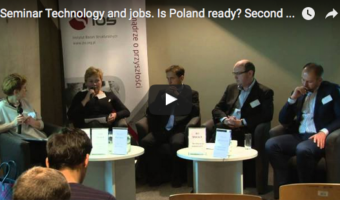The seminar was divided into two sessions of discussions between representatives of enterprises, public administration, international organizations and third sector. The first session, moderated by Matteo Morgandi from the World Bank, has been devoted to a new opportunities for labour market and civil society caused by the ICT resolution. Tomasz Klekowski of Intel EMEA Business GTM has expressed opinion that Poland is successfully exploiting such opportunities and the evidence is that the global technology companies (Amazon, Intel, Samsung) locate here not only basic shared service centres, but also a large R&D facilities. On the other hand, the IT revolution poses also a challenge to enterprises, when it comes to work organization. Traditional methods based on control should be replaced by mutual trust and evaluation of results. Katrin Hippler of Elance – global intermediary between employers and freelancers stated that on Elance platform have registered more than a 26 thousands freelancers from Poland, which makes them 10th largest national group on it. This should be regarded as success. She also pointed out that the IT revolution enabled distance work which is more flexible for both employers and employees. Michał Mach from ePF foundation stressed that IT technologies caused unprecedented opportunity for citizens to influence the operation of state administration. The apps build by young talented programmers enable access to public information and allow civic control over actions of the state representatives. The second discussion, moderated by Aleksandra Pezda of Tok FM and Gazeta Wyborcza, has been devoted to an issue of how to reform education in order to prepare people to live in IT dominated world. Paolo Pasimeni of European Commission pointed out that the results of PIAAC survey show that the use of IT skills at work increases the levels of one’s literacy and numeracy skills. Bill Mitchell of The Chartered Institute for IT presented the ideas behind the reform of curriculum in UK, where since 2014 all schools are obliged to provide IT lessons to children at all stages of education, starting from five-year-olds. Bill Mitchell stressed that the British curriculum involves teaching the ideas behind IT (algorithm, computability, etc.), not a particular software packages, and can be done without the use of computers. Maciej Jakubowski of University of Warsaw and Evidence Institute presented own survey results according to which the amount of time spend on schoolwork on computers at school, as opposed to the time spend on schoolwork on the computer at home does not correlate with the level of literacy and numeracy skills. His conclusion was that the traditional ways of working at school, with the blackboard and team work are still very important. Ewa Dudek – viceminister of education in Poland described the activities of ministry in the area of IT education. She particularly stressed the nationwide teacher training programme and announced the future curriculum change that will include more IT skills teaching at schools at all levels of education.
introduction – Piotr Lewandowski
introduction – Roberta Gatti
first panel session on ICT and new opportunities
second panel session on what are the skills that matter






